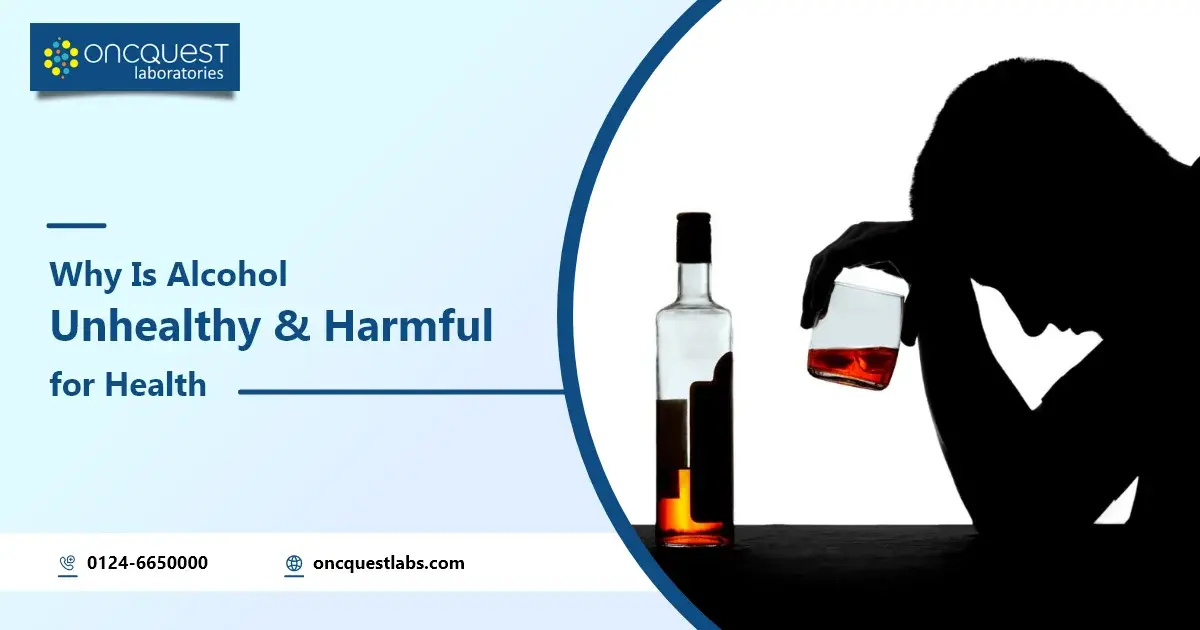In a world where celebrations, social gatherings, and relaxation often involve the presence of alcoholic beverages, it’s essential to take a closer look at the impact of alcohol on our health. While moderate alcohol consumption has been a part of human culture for centuries and is often associated with conviviality, it’s crucial to understand that alcohol, when consumed in excess or over prolonged periods, can be deeply unhealthy and harmful to our well-being.
This blog delves into the multifaceted reasons why alcohol is considered detrimental to our health. We will explore the physiological effects it has on the body, the wide-ranging health risks associated with its consumption, and the importance of responsible drinking. By the end of this article, you’ll have a comprehensive understanding of why alcohol should be approached with caution, even as you raise your glass in celebration. So, let’s begin by examining the chemistry of alcohol and how it interacts with our bodies.
Contents
What is Alcohol?
Alcohol, in the context of beverages, typically refers to ethanol (ethyl alcohol), a psychoactive substance found in various alcoholic drinks. It is the active ingredient responsible for the intoxicating effects of these beverages. Ethanol is produced through the fermentation of sugars by yeast, resulting in alcohol content in the final product. It’s important to note that there are various types of alcoholic beverages, including beer, wine, and spirits, each with different alcohol concentrations and flavor profiles. Ethanol is a central nervous system depressant, which means it can slow down brain activity, resulting in the relaxation and altered perception that people often associate with alcohol consumption. However, this substance can also have negative effects on health when consumed excessively or over extended periods. Understanding how alcohol affects the body and its potential health risks is crucial to making informed choices about its use.
How Alcohol Affects the Body
Alcohol affects the body in several ways, and its impact can vary depending on factors like the amount consumed and individual differences. Here’s an overview of how alcohol affects the body:
- Central Nervous System (CNS) Depressant: Alcohol acts as a depressant on the central nervous system. It slows down brain activity, leading to a feeling of relaxation, reduced inhibitions, and altered perception.
- Impaired Cognitive Function: Even moderate alcohol consumption can impair cognitive functions, leading to reduced judgment, decision-making, and coordination. This impairment is often why alcohol and activities like driving do not mix.
- Digestive System: Alcohol can irritate the gastrointestinal tract, potentially leading to gastritis, acid reflux, and ulcers. It can also interfere with the absorption of nutrients in the digestive system.
- Liver Metabolism: The liver is responsible for metabolizing alcohol. Over time, excessive alcohol consumption can lead to liver damage, including fatty liver, alcoholic hepatitis, and cirrhosis.
- Cardiovascular System: While some studies suggest that moderate alcohol intake might have cardiovascular benefits, excessive alcohol consumption can lead to high blood pressure, irregular heartbeats, and even cardiomyopathy (weakening of the heart muscle).
- Pancreas: Alcohol can lead to inflammation of the pancreas, which can interfere with its normal function. This can result in conditions like pancreatitis.
- Immune System: Excessive alcohol weakens the immune system, making the body more susceptible to infections and illnesses.
- Cancer Risk: There is a link between alcohol consumption and an increased risk of certain types of cancer, including mouth, throat, esophagus, liver, and breast cancer.
- Mental Health: Alcohol can affect mental health, contributing to conditions like depression and anxiety. It can also lead to alcohol use disorder (AUD), commonly known as alcoholism.
- Addiction: The repeated use of alcohol can lead to physical and psychological dependence, making it challenging to quit or cut back on consumption.
- Sleep Disruption: While alcohol can initially make you feel drowsy and help you fall asleep, it disrupts the sleep cycle and often leads to poor-quality sleep.
- Dehydration: Alcohol is a diuretic, leading to increased urination and dehydration, which can result in hangover symptoms.
Understanding how alcohol affects the body is crucial in making informed decisions about its consumption. It’s important to consume alcohol in moderation and be aware of the potential health risks associated with excessive or long-term use. Responsible drinking and seeking help when needed are key to mitigating these risks.
Health Risks Associated with Alcohol
The health risks associated with alcohol consumption are numerous and can have a profound impact on an individual’s well-being. Here are some of the significant health risks linked to alcohol:
- Liver Damage: Prolonged and heavy alcohol consumption can lead to liver conditions such as fatty liver, alcoholic hepatitis, and cirrhosis, which can be life-threatening.
- Heart Problems: While moderate alcohol consumption may have cardiovascular benefits, excessive drinking can lead to high blood pressure, irregular heartbeats, and an increased risk of heart disease.
- Cancer: Alcohol consumption is associated with an elevated risk of various types of cancer, including mouth, throat, esophagus, liver, and breast cancer.
- Mental Health Issues: Alcohol can contribute to mental health problems, including depression and anxiety. It may also exacerbate existing mental health conditions.
- Addiction: Repeated alcohol use can lead to the development of alcohol use disorder (AUD) or alcoholism, characterized by physical and psychological dependence on alcohol.
- Accidents and Injuries: Alcohol impairs coordination and judgment, leading to a higher risk of accidents, falls, and injuries. It is a major contributor to incidents like car crashes.
- Social and Interpersonal Problems: Excessive alcohol use can strain relationships, lead to social isolation, and result in legal or financial troubles.
- Neurological Effects: Heavy drinking can damage the brain, resulting in cognitive deficits, memory problems, and an increased risk of conditions like dementia.
- Gastrointestinal Issues: Alcohol can irritate the stomach lining, leading to gastritis and ulcers. It can also interfere with the absorption of nutrients, contributing to malnutrition.
- Weakened Immune System: Chronic alcohol consumption weakens the immune system, making individuals more susceptible to infections and illnesses.
- Reproductive Health: Alcohol use during pregnancy can harm the developing fetus, leading to fetal alcohol syndrome and other birth defects.
- Sleep Disturbances: Alcohol disrupts the sleep cycle, leading to poor-quality sleep and increased daytime fatigue.
It’s important to note that the risks associated with alcohol vary depending on the amount and frequency of consumption, as well as individual factors such as genetics and overall health. Responsible drinking, if chosen, should align with recommended guidelines, and individuals should be aware of the potential consequences of excessive or prolonged alcohol use. Seeking help and support is essential for those struggling with alcohol-related problems.
Moderate vs. Excessive Drinking
Understanding the difference between moderate and excessive drinking is crucial for making responsible choices when it comes to alcohol consumption. Here’s a breakdown of the two:
Moderate Drinking:
- Definition: Moderate drinking is typically defined as consuming alcohol in a way that doesn’t lead to significant health risks. It involves enjoying alcoholic beverages in a controlled and responsible manner.
- Guidelines: Various health organizations, such as the U.S. Centers for Disease Control and Prevention (CDC), define moderate drinking as up to one drink per day for women and up to two drinks per day for men.
- Benefits: Some studies suggest that moderate alcohol consumption, especially of red wine, may have potential cardiovascular benefits, such as a reduced risk of heart disease.
- Responsible Choices: In moderate drinking, individuals are mindful of their alcohol intake, avoid binge drinking, and consider the impact of alcohol on their health and well-being.
Excessive Drinking:
- Definition: Excessive drinking involves consuming alcohol in quantities or patterns that pose a significant risk to health and well-being. It often includes binge drinking, heavy drinking, or chronic alcohol abuse.
- Binge Drinking: Binge drinking is characterized by consuming large amounts of alcohol in a short period, often leading to a blood alcohol concentration (BAC) of 0.08 or higher. For most adults, this typically occurs with five or more drinks for men and four or more drinks for women within a couple of hours.
- Heavy Drinking: Heavy drinking refers to a pattern of alcohol consumption that exceeds moderate guidelines and often results in an increased risk of health problems.
- Health Risks: Excessive drinking is associated with a wide range of health risks, including liver damage, addiction (alcohol use disorder), increased risk of accidents, social and interpersonal problems, and an elevated risk of chronic diseases like cancer and heart disease.
- Social and Legal Consequences: Excessive drinking can also result in social, legal, and financial consequences, including damaged relationships, legal troubles, and impaired work or academic performance.
It’s important to remember that what constitutes “moderate” can vary based on individual factors, such as age, gender, and overall health. Responsible drinking means understanding your own limits and adhering to recommended guidelines. If you find it challenging to control your alcohol consumption or have concerns about its impact on your life, it’s essential to seek help and support. Alcohol use should always be a conscious and informed choice with consideration for the potential risks.
Who is Most Vulnerable?
Certain groups are more vulnerable to the negative health effects of alcohol due to various factors such as genetics, age, and existing medical conditions. Here are some groups that are considered more vulnerable to the harmful effects of alcohol:
- Young People: Adolescents and young adults are more vulnerable to the harmful effects of alcohol because their brains are still developing. Excessive alcohol consumption during this critical period can lead to long-term cognitive and behavioral issues.
- Pregnant Women: Alcohol use during pregnancy can harm the developing fetus, potentially leading to fetal alcohol syndrome and other birth defects. It’s generally recommended that pregnant women avoid alcohol entirely.
- Elderly Individuals: Older adults may be more susceptible to alcohol-related health problems due to changes in metabolism and reduced tolerance. Alcohol can interact negatively with medications commonly prescribed to seniors.
- Individuals with a Family History of Alcoholism: Genetic factors play a role in alcoholism, and individuals with a family history of alcohol use disorder (AUD) are at a higher risk of developing alcohol-related problems themselves.
- People with Mental Health Conditions: Alcohol can exacerbate the symptoms of conditions like depression and anxiety. People with pre-existing mental health issues should be cautious when using alcohol.
- Individuals with Chronic Health Conditions: Chronic diseases such as liver disease, heart disease, and diabetes can be exacerbated by alcohol consumption. Alcohol can also interact with medications used to treat these conditions.
- Women: Women tend to be more vulnerable to the effects of alcohol due to differences in body composition and metabolism. It often takes less alcohol for women to experience the same effects as men.
- People with a History of Trauma or PTSD: Alcohol is sometimes used as a coping mechanism, but it can worsen the symptoms of post-traumatic stress disorder (PTSD) and lead to a cycle of alcohol abuse.
- Individuals on Certain Medications: Alcohol can interact with medications, reducing their effectiveness or causing adverse reactions. It’s crucial to consult with a healthcare provider about alcohol use when taking medications.
- Individuals with a History of Substance Abuse: Those with a history of substance abuse, including alcoholism, are at high risk for relapse if they consume alcohol. Staying abstinent is often the safest option.
Understanding these vulnerabilities is essential for making informed choices about alcohol consumption. It’s important to consider individual circumstances and potential risks when deciding whether to drink alcohol and, if so, to do so responsibly and in moderation. If you or someone you know is struggling with alcohol-related issues, seeking professional help and support is crucial.
Benefits of Quitting or Reducing Alcohol
Quitting or reducing alcohol consumption can lead to a wide range of physical, mental, and social benefits. Here are some of the potential advantages of giving up or cutting back on alcohol:
- Improved Physical Health:
- Liver Health: Abstaining from alcohol can help the liver repair and regenerate, reducing the risk of liver damage and cirrhosis.
- Reduced Cancer Risk: Quitting alcohol lowers the risk of developing alcohol-related cancers, such as mouth, throat, and liver cancer.
- Heart Health: A decrease in alcohol intake can lead to lower blood pressure and a reduced risk of heart disease.
- Better Sleep: Alcohol disrupts sleep patterns; quitting can lead to improved sleep quality and increased daytime alertness.
- Enhanced Mental Well-Being:
- Reduced Risk of Depression: Alcohol is a depressant and can worsen symptoms of depression. Cutting back on alcohol can improve mood and mental health.
- Anxiety Reduction: Lower alcohol consumption can reduce anxiety and panic attacks in those prone to these conditions.
- Cognitive Benefits: Improved Memory and Cognition: The brain can recover from the cognitive impairments caused by alcohol, resulting in better memory and cognitive function.
- Strengthened Relationships:
- Improved Interpersonal Relationships: Reducing or quitting alcohol can lead to better communication, trust, and emotional connections in personal relationships.
- Family Well-Being: Abstaining from alcohol can create a more stable and nurturing environment for family members.
- Financial Benefits: Cost Savings: Reduced alcohol consumption can lead to significant savings in terms of money spent on alcoholic beverages.
- Legal and Safety Benefits:
- Lower Risk of Legal Issues: Decreased alcohol consumption reduces the risk of involvement in alcohol-related legal problems, such as DUIs.
- Improved Safety: Reduced alcohol intake decreases the risk of accidents and injuries caused by impaired judgment and coordination.
- Longer Life Expectancy: Increased Lifespan: Abstaining from or reducing alcohol consumption can lead to a longer and healthier life, reducing the risk of premature death from alcohol-related diseases.
- Increased Energy and Productivity: Enhanced Productivity: Improved sleep and mental clarity can result in increased energy and productivity in daily life.
- Personal Growth: Increased Self-Esteem: Successfully reducing or quitting alcohol can boost self-esteem and self-confidence.
It’s important to note that the specific benefits of quitting or reducing alcohol can vary from person to person. The extent of improvement in physical and mental health depends on factors such as the individual’s overall health, the duration and intensity of alcohol consumption, and genetic predisposition. Seeking support and professional guidance when making changes to alcohol consumption is often beneficial and can increase the likelihood of achieving these positive outcomes.
Tips for Responsible Drinking
Practicing responsible drinking is essential to minimize the potential health and social risks associated with alcohol consumption. Here are some tips for responsible drinking:
- Know Your Limits: Understand your own tolerance for alcohol and how it affects you personally. This can vary from person to person.
- Set a Limit: Determine in advance the maximum number of drinks you’ll have, and stick to it. For example, follow recommended guidelines for moderate drinking.
- Alternate with Non-Alcoholic Drinks: Drink water or non-alcoholic beverages between alcoholic drinks to stay hydrated and pace yourself.
- Eat Before Drinking: Consuming food before drinking can slow down the absorption of alcohol, reducing its effects.
- Avoid Binge Drinking: Do not engage in binge drinking, which involves consuming a large amount of alcohol in a short period. It’s harmful and can lead to alcohol poisoning.
- Don’t Drink and Drive: Never drink and drive. Arrange for a designated driver or use public transportation, a rideshare service, or a taxi.
- Be Mindful of Medications: Check with your healthcare provider to ensure that any medications you are taking do not interact negatively with alcohol.
- Respect Local Laws: Understand and adhere to local laws and regulations regarding the sale and consumption of alcohol.
- Drink in a Safe Environment: Choose to drink in safe and familiar environments, such as your home or reputable establishments.
- Avoid Peer Pressure: Don’t feel pressured to drink if you don’t want to. Stand firm in your decision to drink responsibly or not at all.
- Know the Signs of Intoxication: Recognize the signs of intoxication, such as slurred speech, impaired coordination, and impaired judgment. If you notice these signs in yourself or others, it’s time to stop drinking.
- Have a Plan: Before you start drinking, plan how you will get home safely, whether it’s by having a designated driver, using a rideshare service, or staying overnight.
- Avoid Drinking Alone: Drinking with friends or family can provide a support system to help you make responsible choices.
- Watch for Peer Pressure: Be cautious of peer pressure and resist drinking more than you’re comfortable with.
- Seek Help If Needed: If you find it challenging to control your alcohol consumption or have concerns about your drinking habits, seek support from a healthcare provider or a support group.
Remember that responsible drinking involves being aware of your own limits and the potential consequences of alcohol consumption. It’s a personal choice that should prioritize your health and well-being while ensuring the safety of yourself and others.
Conclusion
In conclusion, the health risks associated with alcohol consumption are extensive, affecting both physical and mental well-being. While moderate drinking may have some potential benefits, the importance of responsible consumption cannot be overstated. Excessive alcohol use can lead to a multitude of health problems, strain relationships, and even have legal consequences. Understanding the vulnerabilities of certain groups and the potential benefits of quitting or reducing alcohol consumption is crucial. By making informed choices, setting limits, and seeking help when needed, individuals can protect their health, improve their quality of life, and contribute to safer communities. Responsible drinking is not just a choice; it’s a commitment to a healthier and happier future.
Frequently asked Questions- FAQs
Why alcohol is bad for your health?
Over time, prolonged alcohol consumption can result in the onset of chronic illnesses and various severe issues, including elevated blood pressure, heart ailments, strokes, liver diseases, and digestive complications. Additionally, it increases the risk of developing cancers in the breast, mouth, throat, esophagus, larynx, liver, colon, and rectum.
Which is more harmful beer or whiskey?
Whiskey is significantly more potent than beer since it is a spirit and can be more harmful. It contains ethanol, which, due to its high concentration in whiskey, can increase the risk of cancer. However, both beer and whiskey are less likely to pose significant health risks when consumed in moderation.
Can we drink alcohol daily?
For healthy adults, moderate alcohol consumption typically involves up to one drink per day for women and up to two drinks per day for men. A single drink can be equivalent to 12 fluid ounces (355 milliliters) of beer or 5 fluid ounces (148 milliliters) of wine.





